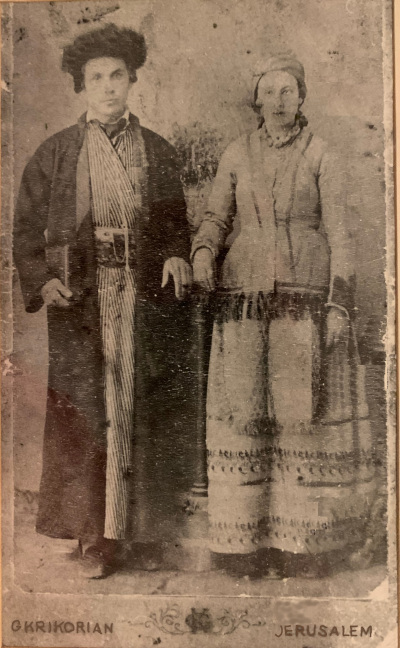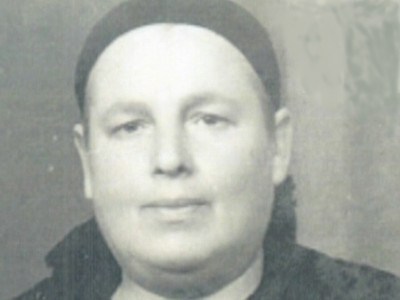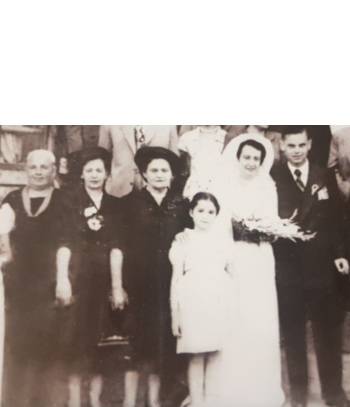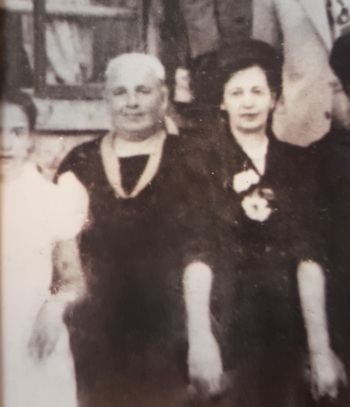Bella Feinstein - Meir's Mother
I remember my Savta (grandmother in Hebrew) Bella as a loving and warm woman who lived in "Kerem Avraham," one of the first neighborhoods of western Jerusalem. She was always very happy to see me and my older brother, Eliezer. Unfortunately, the many tragic events in her life did not help her overall health. She suffered from a lingering heart disease, and she passed away on December 30, 1961 – three days after I turned seven years old. This page is dedicated to the memory of this remarkable, strong, intelligent and loving woman, who nurtured a family that brought forth the hero that was Meir Feinstein, who sacrificed himself on the altar of the emerging Jewish nation in Eretz Israel. She was the cornerstone of a family that was tormented by fate, and left to deal with the pain of several untimely deaths and disasters.
In the following paragraphs, I have embedded my father's story about his family's roots as told in his novel, Yedidya Hatalgi . I have also embedded the collective memory of my siblings and my mother about Savta Bella.
Bella Feinstein was the second wife of my grandfather, Eliezer Feinstein. Eliezer came to Eretz Israel in 1888 from Brisk, which at that time, was a part of Poland. I know that he came with his father, Yehuda Feinstein, as it (Yehuda) was given as my middle name, in honor of Eliezer's father. Both Eliezer Feinstein and Yehuda Feinstein are buried in Mount Olives, near Meir. Yehuda Feinstein was known for a religious work he wrote in the Book of Songs. Eliezer Feinstein was one of the students of Rabbi Yehoshua Leib Diskin, who was known in Jerusalem at that time as the "Rabbi from Brisk." (Hebrew speakers can read more about the Rabbi from Brisk here.) The Rabbi from Brisk liked Eliezer very much because of his amazing industriousness. Eliezer married a Jerusalemite girl, and he opened a small grocery store near Rabbi Yohanan ben Zakkai Synagogue in the old city of Jerusalem. The Rabbi from Brisk blessed Eliezer and wished him success in his business. The wish came true, and Eliezer did well in his business. He soon moved to a larger store on Meidan Street, where he converted the large storage room into a winery. In the winery, he made all kinds of wines: sweet red wines, white wines, sour wines and various liquors. My father, Binyamin, testified that during the wine season, Meidan street was filled with caravans of camels and donkeys carrying big bags full of wine grapes – transported from the grape fields around Hebron to the Feinstein winery.
Eliezer Feinstein saw good blessings in his work and he started a large family with his first wife. His name gained prominence as a successful merchant and as a very honest man. On top of his hard work from morning to evening, he also went to the Yeshiva near the Hurva Synagogue every evening after his work to learn Gemara. This way, he fulfilled the important Jewish commandment of finding a balance between work and Torah studies. He continued this habit of studying the Talmud up until his death.
I fondly remember my half-uncle, Avraham Feinstein, who liked to play with me and test my memory when my father took me to visit him. Although my father kept good relations with his half siblings for many years after the death of Meir, as far as I could see in the records, none of the half siblings were involved with Meir and his activities. They did not attend the trial nor the funeral. Avraham Feinstein was the manager of the Anglo Palestine Bank in Jerusalem, and obviously he could not be seen associated with an Irgun fighter. After his wife passed away, Eliezer married my grandmother Bella. The young and beautiful Bella emigrated to Israel with her mother shortly before the start of the first world war from Bialystock, Poland. Bella was a beautiful and gracious girl, she was tall and she had an amazingly expressive and well carved face (my father's testimony). She was raised with a religious education, and she contributed to her mother's livelihood. When she was matched to Eliezer, they immediately fell in love with each other, even though Eliezer was much older than Bella.

Meir's parents, Bella and Eliezer Feinstein, shortly after their marriage
The picture above was taken in Jerusalem by an Armenian photographer, Gkrikorian, some time after their marriage. My impression from the picture of my grandmother in her youth was of a strong will and very intelligent person. The marriage was very successful, and she gave birth to Aliza, Binyamin and Zvi, before the birth of Meir in 1929.
Bella was a faithful wife and she helped her husband in his business. After the destructive Arab Riots of August 1929, Eliezer decided to cut his ties with his Arabs suppliers, as some of them participated in the killing of the Jews. He sold his grocery and winery and used the money to build a new house on Zahav street in "Kerem Avraham," one of the first neighborhoods of western Jerusalem. The house had eight large rooms, and Eliezer kept two rooms and a closed balcony for his family and rented out the rest of the rooms. He moved there with Bella and their four children, Aliza, Binyamin, Zvi and Meir, and opened a small grocery store nearby to support the family. My father, Binyamin, who was born in 1921, looked very much like his father's appeareance in this picture. Eliezer and Bella Feinstein were orthodox and kept their house strictly Kosher. Their boys were first taught in a small Jewish learning group (Chader), and when they reached the age of three, they were sent to study under the supervision of Rabbi Aryeh Levin at the Talmud Torah (Yeshiva) "Etz Chayim" on Yaffo road in the new city of Jerusalem.
Bella Feinstein became a widow a short time after Meir turned 13 years old in 1942, and she never remarried. Eliezer gave unlimited credit to all his grocery customers, and soon after his death, many customers refuted their bills, causing the family to fall into hard times. Meir left school to help support the family, working in Jerusalem for a short period of time. Later, he left Jerusalem to work as a farmer in Givatayim, on Kibutz Negba, and on Kibutz Givat HaShlosha. It was very hard for Bella Feinstein to have her youngest child away from home from such a tender age.
Meir's Service in the British Army
Meir joined the British army in 1944 and served more than two years in the Middle East Corps of Engineering. He served in Eretz Israel, in Egypt (mostly in the Western Desert and Alexandria) and in Beirut, Lebanon. It was very hard for Meir and his mother to be separated, but the family believed that Meir was doing good for the Jewish people by helping the British fight the Nazis. But after the end of the World War, Meir was not eager to stay in the western desert of Egypt, far away from his homeland. His mood is best described in his own letter to his mother dated January 1946:
Dear mother,
A big hello to you,
I am sitting by myself in my tent and writing this letter to you. You have asked me
to write to you when I safely arrive to my base, and I am sorry that I am a few days late.
I remember our military train getting away from our country minute by minute,
carrying Hebrew soldiers from their country to a foreign land. I was watching the mountains
of Judea from my window, knowing that in few minutes I will not see them again for three months.
I am looking inside the train and thinking: again being away for three months! And maybe even more?
At that time I am looking at my fellow Hebrew soldiers sitting around me in the train and
I am telling myself that I am sharing their sadness – my sadness.
Within one minute, one of the soldiers sitting in front of me made a big sigh and said:
“Until when? God of the universe, when will be the end of these wanderings? Until when,
or more correctly, how many more times we will need to go away and come back to our country?
During the war, we could have understood these wanderings, but now, the war is over,
what do we have with army? Is it not enough that I had three years of wanderings with this army?
Yes, three bloody years!”
“And I, three and a half years!” Said another soldier.
And then another soldier asked me when I will be released. I answered him that my release is due in a year
and a half, but he did not believe me, because it looked to him that I answered very casually. At the same time,
there was a group of English soldiers sitting at the corner of the train car, singing a lousy song.
It looks like they are already going home to be released from the army, and we are quite hopeless.
As for myself now, I am healthy and whole (בריא ושלם), and I have everything I need. How are you at home?
I hope everything is OK there. Good bye and please answer me quickly.
From your loving son,
Meir.
In his letters from that time, he described the views of the Western Egyptian desert and the life in the military tents and the British bases. During his service in the Western Egyptian desert, he had a severe accident with a military motorcycle he was riding on duty. It suddenly turned over and he broke his hand. His hand was put in a cast and he was hospitalized for one month, without telling his mother and brothers, as he did not want to worry them. Only three months later, in April 1946, when Meir was finally released from the British army, his family learned about this accident.
Meir's Trial
I have described how Bella suffered during Meir's trial, knowing that her youngest boy was only 17 years and eight months old, and therefore, should not have been executed. The British police confiscated Bella's personal documents, including the birth certificate that would have proven Meir's true age. Several days before the planned execution, Bella made one last effort to convince her son to sign a pardon request. Meir did it very reluctantly, only after my father mistakenly told him that the Irgun commander, Menachem Begin, agreed about his pardon request. The following picture shows my dear grandmother from about that time.

Bella Feinstein circa 1947
Bella Feinstein at my Parents Wedding
Four years after the death of Meir, my father, Binyamin Feinstein married my mother, Chaya Ettle Bash, the daughter of Meir Bash and Ahuva Dvora Bash. Both my maternal grandparents were born in Jerusalem and came from families that immigrated to Eretz Israel in the 1840s. The following pictures from the wedding shows Savta Bella on the left of my maternal grandmother Savta Ahuva. It is evident from the pictures that the tragic times beginning in 1947 took their toll on Bella Feinstein.
Her Legacy
Bella Feinstein passed away on Saturday, December 30, 1961. N. Avieli, mentioned her death in an article on the back page of the Herut newspaper of January 1st, 1962, stating, "Bella Feinstein N'E, who died this Saturday was a well known righteous woman in Jerusalem. She was the mother of Meir Feinstein HY'D, the Irgun soldier who exploded himself with his friend, Lehi member Moshe Barazani HY'D, a short time before the British rulers planned to put them on the gallows. She left a son and a daughter."
I recently talked to my mother, Chaya Feinstein, who is now 89, and asked her about her relations with her mother-in-law, Bella Feinstein.
"Savta Bella was a woman with a great heart. She was such a warm person. I loved her very much, and every time I came to your father's home I sat with her for hours and she would talk to me in Yiddish. In fact, I myself became more fluent in Yiddish thanks to the many talks I had with my beloved mother-in-law. Her house was always clean and she always welcomed us with much happiness and affection.
Your father was very dedicated to his mother, and he was visiting her many times when he left his work. His work place was very close to his childhood home, where savta Bella lived all her life. Your father wanted to help her with money, but she always rejected this. She said that she can manage with whatever she has. She was a strong person and always wanted to help others.
She had such a good nature and patience with everyone. She loved you and Eliezer very much. All her children, your father Binyamin, Zvi, Aliza and Meir inherited their goodness directly from her. She was crying when she heard about the hardships in other people lives. She was very smart and she talked to me a lot about the issues of the days, including politics.
She did not speak Hebrew well, only Yiddish, but she made an effort when she played with you and Eliezer to talk to you in Hebrew. You and Eliezer always were very happy when Savta came to visit you. And she really cherished every moment she can sit with you and play.
Although she had a very tough life, she was content with her lot. Unfortunately, her daughter, Aliza, has a daughter that had some severe birth defects to be mentally retarded and deformed. Her second son, Zvi, also died young from an ulcer. When Eliezer and you were born, she was so happy that you were both healthy babies."
My younger sister, Bella Keret, who is named after our grandmother, told me that our mother said that even though she thought the name Bella was archaic (actually she described the name as a "Yachne name" - and if you know Yiddish, you know what she meant), she was extremely proud and happy to call my sister Bella, in honor of her beloved mother-in-law.

